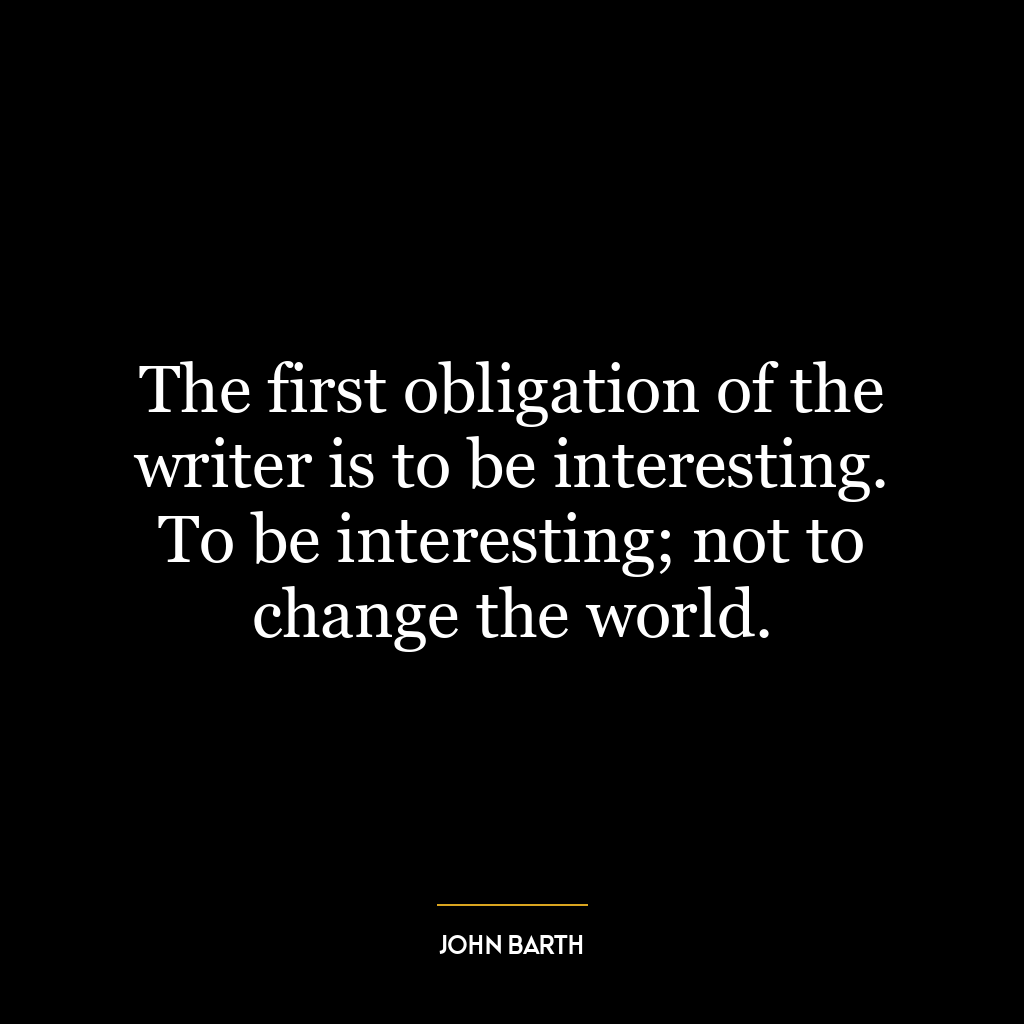John Barth Quotes
- Writer
- 1930
John Barth (1930-2021) was an American novelist and short story writer, best known for his postmodernist works. He was a professor at Johns Hopkins University for over 40 years and was a major figure in the American literary scene. His most notable works include The Sot-Weed Factor (1960), Giles Goa…Read More
John Barth (1930-2021) was an American novelist and short story writer, best known for his postmodernist works. He was a professor at Johns Hopkins University for over 40 years and was a major figure in the American literary scene. His most notable works include The Sot-Weed Factor (1960), Giles Goat-Boy (1966), and Lost in the Funhouse (1968). He was awarded the National Book Award in 1973 for Chimera and was a Pulitzer Prize finalist in 1979 for Sabbatical. He was also a recipient of the National Humanities Medal in 2001.Read Less
John Barth (1930-2021) was an American novelist and short story writer, best known for his postmodernist works. He was a professor at Johns Hopkins University for over 40 years and was a major figure in the American literary scene. His most notable works include The Sot-Weed Factor (1960), Giles Goat-Boy (1966), and Lost in the Funhouse (1968). He was awarded the National Book Award in 1973 for Chimera and was a Pulitzer Prize finalist in 1979 for Sabbatical. He was also a recipient of the National Humanities Medal in 2001.
15 Inspiring John Barth Quotes
John Barth Career Highlights
- Barth’s literary career began in 1956 with the publication of his first novel, “The Floating Opera.” The novel received critical acclaim and established Barth as a prominent figure in the postmodernist movement.
- In 1960, Barth published his second novel, “The End of the Road,” which further solidified his reputation as a leading postmodernist writer.
- In 1966, Barth published his most famous work, “Giles Goat-Boy,” which was a satirical take on the coming-of-age genre. The novel was a commercial and critical success, cementing Barth’s place in the literary world.
- In 1972, Barth published “Lost in the Funhouse,” a collection of short stories that showcased his mastery of metafiction and postmodernist techniques.
- In 1989, Barth published “The Tidewater Tales,” a novel that explored the history and culture of his hometown, Cambridge, Maryland.
- Throughout his career, Barth has received numerous awards and honors, including the National Book Award, the PEN/Malamud Award for Excellence in Short Fiction, and the Lannan Literary Award for Fiction.
Key Contributions by John Barth
- Barth’s writing style is characterized by his use of metafiction, which blurs the lines between reality and fiction. He often includes himself as a character in his works, blurring the boundaries between author and narrator.
- Barth’s works also often feature intertextuality, where he references and incorporates elements from other literary works into his own. This adds layers of meaning and complexity to his writing.
- Barth’s exploration of themes such as identity, reality, and the role of the author in literature has greatly influenced the postmodernist movement and inspired many other writers.
- His use of humor and satire in his works has also been praised for its cleverness and wit.
What Sets John Barth Apart
- Barth’s unique writing style and his ability to push the boundaries of traditional storytelling have set him apart from other writers of his time.
- His works have been described as both challenging and entertaining, making him a favorite among readers who enjoy intellectually stimulating literature.
- Barth’s deep understanding of literature and his ability to incorporate various literary techniques into his works have made him a highly respected figure in the literary world.
Takeaways
- John Barth’s career highlights and key contributions have solidified his place as one of the most influential postmodernist writers of the 20th century.
- His use of metafiction and intertextuality has greatly influenced the literary landscape and inspired many other writers.
- Barth’s works are a testament to his intelligence, creativity, and mastery of the written word, making him a must-read for anyone interested in postmodernist literature.






















